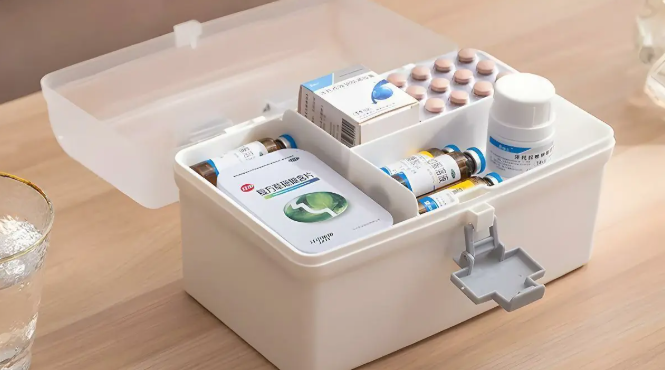
Introduction
Medications play an important role in healthcare. However, to ensure they remain effective and safe, it’s important to understand how to properly store and dispose of them safely. This article describes best practices for storing medications to maintain their effectiveness and how to properly dispose of unused or expired medications to protect against health and environmental risks.
Basic rules for storing medicines
- Store medications at the proper temperature : One of the most important factors when storing medications is temperature. Most pharmaceutical products must be stored at a specific temperature, usually between 15°C and 30°C. Read the label carefully for recommendations.
- Store medications in a dry place: Medicines should be stored in dry places to avoid humidity which could affect their effectiveness. Avoid storing them in places where humidity is high, such as the bathroom, for example.
- Store medications away from light: Some medications are sensitive to light and should be kept in opaque packaging or cabinets to prevent deterioration.
- Keep medications in their original packaging: Keep medications in their original packaging so that identification and dosage information can be found easily.
- Keep medications away from children: Ensure medications are stored in a place out of reach of children, such as a lockable cabinet or box. Packaging marked “child-resistant” is recommended.
- Respect expiry dates: Never consume medications after their expiry date, as their effectiveness could be reduced and they could become dangerous.
Specific drug storage locations
- Some medications, such as liquid antibiotics and insulin, must be stored in the refrigerator. Follow the manufacturer’s instructions and avoid freezing.
- Moisture-sensitive medications such as effervescent tablets should be stored in closed containers to prevent mold growth.
- Opioid pain relievers such as oxycodone can be misused and should be kept in a safe place.
- Pet medications should also be stored securely in a safe place and inaccessible to children and other animals.
Best practices for medication disposal
- Do not flush unused or expired medications down the toilet or drain, as this may contaminate drinking water or the environment.
- Take advantage of medication return programs: Many pharmacies and medical facilities offer medication return programs that allow you to safely return unused medications.
- Always read the medication instructions carefully, as there are medications that may have specific recommendations for their disposal.
- Some opioid medications can be inactivated using special equipment available at pharmacies. This renders the medication useless and less likely to be abused.
- If no return option is available, you can mix the unused medication with used coffee grounds or cat litter before disposing of it in the trash. Seal the bag containing this mixture tightly.
- If you have any questions about the safe disposal of your medications, please contact your pharmacist. They can provide you with specific and helpful advice.
How to raise awareness about safe storage and disposal of medicines?
- Raising public awareness: Public education campaigns are essential to raise awareness of the risks associated with improper storage and disposal of medicines. Governments and health institutions must play an active role in raising awareness.
- Ongoing Patient Education: Healthcare professionals should continue to educate patients about proper medication storage and disposal when writing each prescription.
- Drug Recycling: Research is currently underway in many regions on pharmaceutical recycling, which involves repackaging unused drugs and distributing them to people in need.
Conclusion
Medication storage and disposal are important components of responsible health management. By practicing proper storage methods, you can ensure that your medications remain effective, useful, and safe. On the other hand, proper disposal of unused or expired medications helps protect the environment and prevent medication misuse. With public education and awareness, we can all help ensure that medications are used safely and responsibly for the benefit of our health and our planet.

